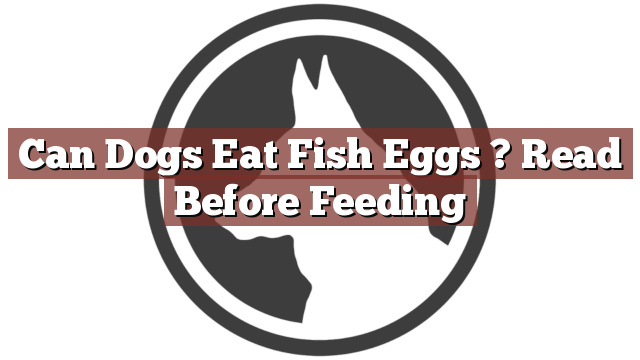Understanding Your Dog’s Dietary Needs
As responsible pet owners, it is crucial to understand our dog’s dietary needs in order to provide them with a balanced and nutritious diet. While dogs are primarily carnivorous, their diet can include a variety of foods to ensure they receive all the essential nutrients. It is important to remember that not all human foods are suitable for dogs, and some can even be harmful to their health. Therefore, it is essential to research and consult a veterinarian before introducing any new food into your dog’s diet.
Can Dogs Eat Fish Eggs? Read Before Feeding
Can dogs eat fish eggs? This is a common question that many dog owners may have. The answer is yes, dogs can eat fish eggs, also known as roe. Fish eggs are a good source of protein, omega-3 fatty acids, and essential vitamins and minerals. These nutrients can contribute to your dog’s overall health and wellbeing. However, it is important to note that moderation is key. Fish eggs should only be given as an occasional treat and should not replace your dog’s regular diet.
The Pros and Cons of Feeding Fish Eggs to Dogs
Feeding fish eggs to your dog comes with both pros and cons that should be carefully considered.
Pros:
-
Nutritional Benefits: Fish eggs are rich in protein, which is essential for muscle development and repair. They also contain omega-3 fatty acids, which promote healthy skin and coat, reduce inflammation, and support brain health. Additionally, they provide vitamins and minerals that contribute to your dog’s overall wellbeing.
-
Variety in Diet: Introducing fish eggs as an occasional treat can add variety to your dog’s diet. Variety is important to prevent dietary boredom and can encourage a healthy appetite.
Cons:
-
Allergies: Some dogs may be allergic to fish or fish eggs. If your dog has never consumed fish before, it is advisable to start with a small amount and monitor for any allergic reactions such as itching, vomiting, or diarrhea.
-
High in Fat: Fish eggs are relatively high in fat, which can be problematic for dogs with certain health conditions such as pancreatitis or obesity. It is important to feed fish eggs in moderation and consider your dog’s specific dietary needs.
Conclusion: Considerations for Feeding Fish Eggs to Your Dog
In conclusion, while dogs can eat fish eggs, it is important to do so in moderation and consider your dog’s individual dietary needs. Fish eggs can provide nutritional benefits, but they should only be given as an occasional treat and should not replace your dog’s regular diet. If you have any concerns or doubts, it is always best to consult with your veterinarian before introducing any new food into your dog’s diet. Remember, the key to a healthy and happy dog is a well-balanced and varied diet that meets their unique nutritional requirements.
Thank you for taking the time to read through our exploration of [page_title]. As every dog lover knows, our furry friends have unique dietary needs and responses, often varying from one canine to another. This is why it's paramount to approach any changes in their diet with caution and knowledge.
Before introducing any new treats or making alterations to your dog's diet based on our insights, it's crucial to consult with a veterinarian about [page_title]. Their expertise ensures that the choices you make are well-suited to your particular pet's health and well-being.
Even seemingly harmless foods can sometimes lead to allergic reactions or digestive issues, which is why monitoring your dog after introducing any new food item is essential.
The content provided here on [page_title] is crafted with care, thorough research, and a genuine love for dogs. Nevertheless, it serves as a general guideline and should not be considered a substitute for professional veterinary advice.
Always prioritize the expert insights of your veterinarian, and remember that the health and happiness of your furry companion come first.
May your journey with your pet continue to be filled with joy, love, and safe culinary adventures. Happy reading, and even happier snacking for your canine friend!

